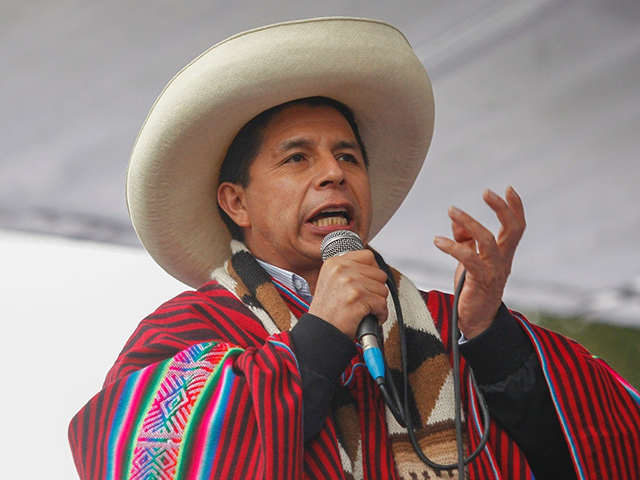Peru’s communist former President Pedro Castillo made a formal request to the Inter-American Commission on Human Rights (IACHR) — an autonomous entity of the Organization of American States (OAS) — on Tuesday for his immediate release from prison and reinstatement as Peru’s head of state.
Castillo’s arrest, in response to his unconstitutional attempt to dissolve Congress and rule by decree, prompted a wave of violent leftist riots that began in December and continues today. At press time, the Peruvian government has attributed 69 deaths and counting to riot-fueled violence demanding Castillo be reinstated.
Castillo’s lawyer – Walter Ayala Gonzales, who also served as Castillo’s Minister of Defense between July and November 2021 – announced the legal move. The lawyer expressed that the request was presented to the IACHR due to alleged delays by Peruvian constitutional courts in solving an injunction appeal presented at the end of January that sought to release Castillo from prison.
“In view of the unjustified delay of the Judiciary in resolving the injunction, Pedro Castillo requests the IACHR to reinstate him as constitutional president of Peru and his immediate release,” Ayala Gonzales tweeted on Tuesday, claiming that “there will be news in the next days” without giving further details.
Pedro Castillo, who served as president of Peru between July 2021 and December 2022, was arrested and impeached on December 7, 2022, after a failed attempt to dissolve the nation’s Congress and rule by decree — an act commonly known as a “self-coup” (autogolpe) in Peruvian politics. Castillo’s failed attempt at dissolving the nation’s Congress was carried out shortly before Congress was scheduled to vote for his impeachment.
Dina Boluarte, who up until then served as Castillo’s vice president, was sworn in as the nation’s sixth president in six years. Since then, the former communist president has remained arrested and is currently serving 18 months of preventive prison at the Barbadillo prison on charges of “rebellion” and conspiracy to abuse authority, with his trial scheduled to take place on June 6, 2024.
In an interview given to the Peruvian media network Radio Programas del Perú on Tuesday, Ayala Gonzales justified the request done to the IACHR, claiming that Castillo is still “technically” the president of Peru. The lawyer also asserted that although he “did not approve” of Castillo’s dissolution of Congress, “no crime has been committed” by the former communist president.
“I have every conviction that Pedro Castillo is going to win in the international jurisdiction because here in the Judicial Power they are delaying the processes,” Ayala Gonzales said. “I think that what he did at that moment [the self-coup attempt] I do not approve of, that he tried to dissolve the Congress, but what I do say is that the crime has not been committed.”
Following Castillo’s failed self-coup attempt and subsequent arrest, sympathizers of the former president responded by unleashing a wave of violent protests and riots that included the blocking of roads, attempts at seizing some of the nation’s airports, and the burning of a historical building in the Capital city of Lima.
The rioters initially demanded the immediate liberation of Castillo, Boluarte’s resignation, the dissolution of Congress, and new general elections before their intended 2026 date as the nation’s constitution dictates — eventually adding demands for a new constitution for Peru. Boluarte eventually caved to the protesters’ demands, presenting two law projects to the Peruvian Congress that would allow for elections to take place in 2023 and being the proceedings to draft a new constitution for Peru. Both of the law projects have failed to pass several times at the Peruvian Congress.
The violent protests, which have begun to subside after two and a half months, have so far left a total of 69 reported deaths — including a premature newborn baby and a 51-year-old woman that required urgent health care dying as a result of the road blocks in January, and a police officer burned alive by the violent rioters among the most notable victims.
The protests also allowed the Marxist terrorist organization Shining Path to resurface after having been largely eradicated in the 1990s. Peruvian officials identified Shining Path members actively participating in the riots and inciting them.
The request presented by Castillo to the IACHR was announced moments after Peruvian prosecutors formalized a preparatory investigation against Castillo for the crimes of organized crime, conspiracy, and influence peddling to the detriment of the State allegedly committed during his tenure as president of Peru. Additionally, Castillo is being investigated for alleged irregular promotions in the armed forces — a case where the former defense minister and Castillo’s lawyer is also implicated.
This week does not mark the first time the former president requests the IACHR intercede on his behalf. In December 2022, lawyer María Hurtado Ambrosio, another of Castillo’s lawyers, sued the Peruvian state at the IACHR, demanding Castillo’s immediate reinstatement as president, claiming that he had been “arbitrarily detained.”
The IACHR, which condemned Castillo’s attempt to dissolve Congress, has not responded to either of Castillo’s requests. The organization condemned the rise of violence in Peru while calling for peace and negotiations between the Peruvian government and the rioters. It sent a delegation to Peru in January to observe the human rights situation as a result of the riots.
Christian K. Caruzo is a Venezuelan writer and documents life under socialism. You can follow him on Twitter here.

COMMENTS
Please let us know if you're having issues with commenting.